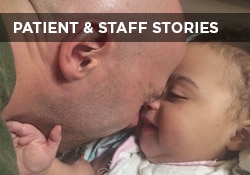This website uses cookies so that we can provide you with the best user experience possible. Cookie information is stored in your browser and performs functions such as recognising you when you return to our website and helping our team to understand which sections of the website you find most interesting and useful.

Susan E. Mazer, Ph.D. Blog
Thoughts and ideas on healthcare
Hi, and welcome to my blog! I'm Susan E. Mazer -- a knowledge expert and thought leader on how the environment of care impacts the patient experience. Topics I write about include safety, satisfaction, hospital noise, nursing, care at the bedside, and much more.
Removing Pain Management Questions is Not the Answer
August 12, 2016
 When I first read about the Centers for Medicare and Medicaid Services’ proposal to remove the pain management questions from the HCAHPS survey to combat the opioid epidemic, I thought it was strange.
When I first read about the Centers for Medicare and Medicaid Services’ proposal to remove the pain management questions from the HCAHPS survey to combat the opioid epidemic, I thought it was strange.
However, as I learned more, it became clear that the link between HCAHPS and the opioid epidemic is because more may be considered better when it comes to pain meds.
The American Medical Association and American Hospital Association have each pointed to the possibility of over-prescribing narcotics as a result of the pain management questions and pressure to get good HCAHPS scores. In other words, if patients are going to complain that their pain was not well controlled, err on the level of more control.
There is expediency in giving drugs. It doesn’t require a lot of work on the part of the clinicians or the patient, actually. Except for the fact that pain is not relieved by drugs alone, unless they are over prescribed.
Pain Management An Ongoing Challenge
While the questions about pain management can be removed from the survey, pain remains an ongoing challenge and the basis for pre-emptive fear for patients and their families.
Neuroimaging studies have looked at how the brain responds to emotional input when dealing with pain. The emotional impacts the physical, something that was once thought to be impossible.
Neuroscientist Dr. Mario Beauregard of the University of Arizona concluded that “beliefs and expectations can markedly modulate neurophysiological and neurochemical activity in brain regions involved in perception, movement, pain, and various aspects of emotion processing.”
All of this came from the use of functional MRIs that allowed Dr. Beauregard to see in real time that emotional self-regulation can control the neurological pathways that impact the perception of pain.
More Than Just Drugs
So, what does all this mean in the face of fighting opioid addiction and the relentless need for effective pain management? Using positive distractions to improve the emotional state of patients has already been shown to be effective.
Creating an environment that minimizes stress and optimizes comfort can improve coping skills and reduce anxiety. Most of all, giving patients the opportunity to make positive decisions on their own behalf is also critical.
Drug dependency, however, is complicated and hard to manage in the face of a medical need for pain control.
The Center for Disease Control (CDC) provided guidelines and a detailed review of extant research to help primary care and family physicians make decisions about the use of opioids based on peer-reviewed data. The more critical question is how to use opioids effectively and lower the risk of addiction.
Today, the U.S. healthcare system is screaming about over-prescribing of pain meds while patients are screaming for relief. And, the need for serious training in treating addiction cannot be understated. It is no longer a specialty. It is a need spreading over the entire community.
We can remove the questions about pain from the HCAHPS survey, but we cannot accept untreated pain in the name of control or addiction or overdose as an outcome of over-treatment.
P.S. If you like this post, please do me a favor and share on LinkedIn, Twitter, Facebook, etc. Also to get automatic notices when a new post is published, subscribe (upper right). No spam – just great content. Thanks!










